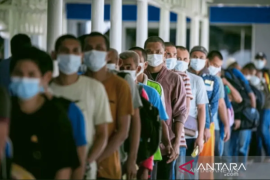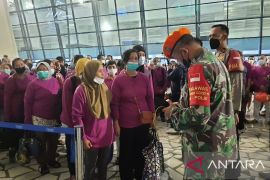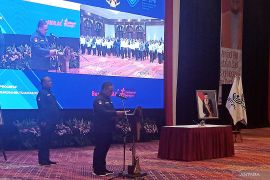Over the past few weeks, the government has been spending much energy, time and money on preparing policies and steps for the protection of around five million Indonesians working overseas.Jakarta (ANTARA News) - Things have been developing very fast regarding efforts to protect TKIs overseas, since the beheading of Ruyati, an Indonesian migrant worker (TKI) in Saudi Arabia last June 18, for murdering her employer.
Over the past few weeks, the government has been spending much energy, time and money on preparing policies and steps for the protection of around five million Indonesians working overseas.
On June 22, 2011, the government announced a moratorium on the dispatch of migrant workers (TKIs) to Saudi Arabia as of August 1, 2011, pending negotiations with the Saudi Arabian government on the protection of TKIs whose number is around 1.5 million workers mostly as housemaids in the Arab kingdom.
Saudi Arabia "responded" on June 29, 2011, by announcing that it would stop granting work permits to Indonesian and Philippine maids after failing to agree on hiring conditions imposed by the two ASEAN countries.
"The Ministry of Labor will stop issuing work visas for domestic workers for the Philippine and Indonesia from Saturday (July 2)," said Hattab Bin Saleh Al-Anzi, a spokesman of the Saudi Ministry of Labor.
ArabNews.com reported that Al-Anzi said that Saudi recruitment agents would recruit domestic workers including maids from different countries other than Indonesia and the Philippines.
Saudi officials have previously announced their plans to employ more domestic workers from Bangladesh, Ethiopia, India, Nepal, Eritrea, Sri Lanka, Mali and Kenya.
"This is a problem for us. We do have a significant number of our overseas Filipino workers in Saudi Arabia," Filipino Foreign Secretary Albert del Rosario said as reported by AFP, Friday (July 1).
Saudi Arabia was one of the biggest host countries of foreign labour, with Manila estimating 1.3 million of nine million Filipinos working abroad were based there.
Minister Albert del Rosario believed that the problem must be dealt with by diplomatic means, and the labour department representative would soon be dispatched to Riyadh to seek clarifications over the ban.
Meanwhile, the Indonesian government reacted differently from the Philippines, to the Saudi decision to stop issuing visas for Indonesian maids.
Manpower Minister Muhaimin Iskandar welcomed the Saudi government`s decision, saying it was in line with the Indonesian government`s moratorium on workers dispatch to Saudi Arabia.
The foreign ministry and the legal and human rights ministry basically also said there was no problem with the Saudi decision and they even welcomed it.
To accommodate migrant workers failing to find job overseas, the government has prepared a plan to allocate funds amounting to Rp1.4 trillion for the National Program of Community Empowerment (PNPM) Mandiri.
Coordinating Minister for Economic Affairs Hatta Rajasa recently said the funds collected from savings carried out by ministries, which have amounted to Rp15.1 trillion so far.
"This is a program that we have prepared for handling the impact of the moratorium. We have to respond to and address the problem," he said.
Some 1.96 million people are expected to receive benefits from the program, especially those living in 38 districts which have been identified as suppliers of Indonesian migrant workers (TKIs) overseas.
"We will focus on developing or creating programs in those regions. The national education ministry in cooperation with other ministries will coordinate the training programs," Hatta said.
The targets of the program are productive-age women living in districts/towns which used to supply migrant workers to countries such as Saudi Arabia.
Minister Muhaimin hoped the program could create job opportunities for around 2.5 million people annually, to compensate around 15,000-20,000 TKIs per month who could not go to Saudi Arabia because of the moratorium.
President Susilo Bambang Yudhoyono on June 24, 2011, said the government prepared three sectors, namely infrastructure, manufacturing and plantation to absorb the unemployed following the implementation of the moratorium.
Yudhoyono also hoped that the smallholder credit scheme (KUR) could be expanded and improved to support micro-, small and medium businesses.
"Actually, if all of them are carried out more employment will be created and solution will be available in exchange for the moratorium," he said.
The head of state also decided to post legal and human rights attaches in countries receiving TKIs to help protect the workers.
In addition to those steps, the National Agency for Placement and Protection of Indonesian Migrant Workers (BNP2TKI) recently launched a toll-free call center "Halo TKI" number 0800-1000.
"`Halo TKI` number 0800-1000 is accessible by home phone and mobile phone," BNP2TKI Chairman Moh Jumhur Hidayat said. The call center is operational for 24 hours and as of July 1, 2011, the toll free call center can be accessed by those using services of all telecommunication providers.
The call center also provides free services of short text messages to number 7266 for TKIs overseas as well as at home.
Complaints could also be sent by facsimile to number (021) 7981205, or letters mailed to Call Center BNP2TKI, Jalan MT Haryono Kav 52, Pancoran, Jakarta Selatan, or e-mail to halotki@bnp2tki.go.id.
All complaints from TKIs will be handled by trained and capable personnel of the Call Center," he said.
The Call Center will also provide other services such as information service, lawyers for troubled TKIs, and mediation service.
And the biggest headache for the government is the fact that 216 Indonesians are facing death penalty overseas, with Malaysia hosting the largest number of such cases.
President Yudhoyono said when chairing a meeting on the Task Force of Indonesian Migrant Workers (TKIs) here Friday (July 1) of the 216 Indonesians facing death penalty abroad, 70 percent were involved in drug trafficking and 28 percent had committed murders.
The government has managed to help set free some of those facing death penalty abroad, get reduction of their punishment or even pardon, he said, adding that the government will keep on helping them.
"I call it not an easy task. many people say it`s mission impossible, but there is a God way, the impossible could become possible," the president said.
According to the foreign affairs ministry`s data, some 117 migrant workers are facing the death penalty in Malaysia, 20 in China, 17 in Saudi Arabia and two in Singapore.
The foreign ministry through its representative offices abroad handled 15,766 cases and until March this year it has handled 1,482 cases.
To help the workers being threatened by the death penalty overseas, President Yudhoyono has decided to set up a special task force.
The special task force is needed to make the handling of the troubled TKIs more focused, the head of state announced at a press conference at his office on June 23.
Coordinating Minister for Political, Justice and Security Affairs Djoko Suyanto revealed the name of the TKI Task Force`s members, among others Mahfuth Basyuni (former religious affairs minister), Bambang Hendarso Danuri (former national police chief), Hendarman Supandji (former attorney general), and Alwi Shihab (former foreign affairs minister).
The task force`s first assignment will be handling the cases of 22 Indonesian migrant workers now facing the death penalty in Saudi.
The government will also call its ambassadors to Malaysia, China and Singapore to discuss the fate of the TKIs facing death penalty in those countries. The Indonesian ambassador to Saudi Arabia is already in Jakarta.
The President said comprehensive coordination is needed to produce the best efforts for the TKIs protection abroad.(*)
Reporter: By Fardah
Editor: Heru Purwanto
Copyright © ANTARA 2011











